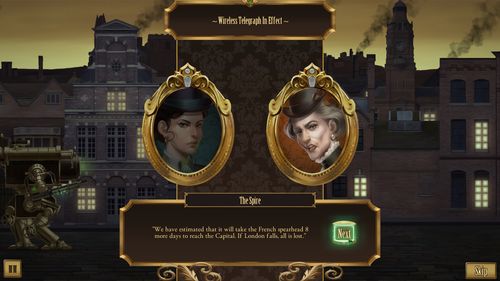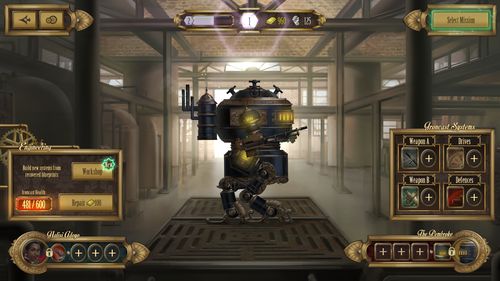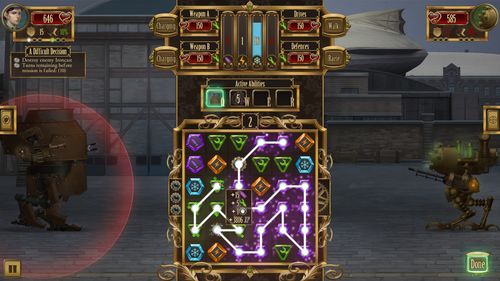Ironcast is a roguelike match-3 puzzle game set in an alternate history, steampunk version of Victorian-era Britain. After the discovery of a new power source, France and Britain are locked in a war that seems to have hit a stalemate. Giant steam-powered walking tanks called "ironcasts" are the latest weapon of this seemingly neverending war. On the eve of a massive French invasion, we join the British ironcast pilots as they make a desperate stand. For freedom! For glory! For giant robot combat and gem matching!

I first saw Ironcast at the SxSW Interactive Gaming Expo, at the Ripstone booth. Developed by Dreadbit, Ironcast is scheduled for release on Steam on March 26th, 2015. (The official Steam store page is here.) The fine folks at Ripstone were nice enough to provide us a copy so we could review it, but they had no input in the content of our review and they haven't given us any other incentives that would compromise our review.
Ironcast Review: A Sophisticated Introduction for the Discerning Reader
For years now, match 3 puzzle games have generally been associated with casual games like Candy Crush Saga and Bejeweled. There have been some attempts to blend this type of puzzle with other genres before, with Puzzle Quest being the most notable example.
Ironcast takes match 3 puzzle elements and blends in roguelike elements. Roguelike-style RPG elements in particular are here in spades. For instance, as you win missions your ironcast levels up. As it does so, you unlock new abilities. Scrap earned from missions can be traded for upgraded equipment if you find the right blueprints. Another roguelike element is the permadeath - if your ironcast is destroyed, that's it - game over.
In fact, the roguelike/RPG elements of the game remind me a lot of one of my favorite roguelike games - FTL. You can only play so many missions before the French invasion reaches its climax and you have to face off against a massive boss. In the meantime, you've got to balance a number of competing needs.

Will you take missions that give you bonus scrap, so you can buy better gear? Or perhaps you'll focus more on gaining manpower, which weakens the boss before you have to fight it? What systems will you focus on - defensive or offensive? Some balance of both? How will you spend your level up bonuses? There is a wealth of strategic options, and the random nature of the game means that you're likely to choose a different set of priorities on each new run through the game.
Like many modern roguelikes, Ironcast features some "meta" elements that allow you to get more powerful even after you lose. After death, your experience is added to a global pool that unlocks new ironcasts, pilots, and other bonuses.
Sometimes if I'm having a bad run, I'll purposefully take a big risk because I know I'm falling behind the power curve. If it pays off, great! Maybe I can continue the game. But if I fail, no big deal - I'll start the next game with perhaps a new ironcast or a slight bonus.
Ironcast Review: A True Gentleman's Guide to Refined Steam Combat
Once in combat, Ironcast's match-3 elements are given their chance to shine. If you're more familiar with Bejewled-style match-3, Ironcast may take a bit of getting used to. Veterans of Puzzle Craft (one of our favorite mobile games) will feel right at home, though. Gems of the same color can be chained together in any direction, for as many gems of the same color as you can get in a line. This can lead to some spectacularly large matches, which are capable of clearing the entire screen.

At the top of the screen is the status of your ironcast - individual systems have their own HP and can be targeted by the enemy. The overall health of your ironcast is also here, and if this hits 0 it's game over. The ironcast requires certain resources in order to operate:
- Ammo allows you to fire your weapons, to deal damage to the enemy. Individual enemy systems can be targeted, if you so desire.
- Energy allows you to power up your ironcast's shields, which absorb damage, or to keep it moving, which increases your chance to dodge.
- Repair lets you fix damage to your ironcast's subsystems, although you can't repair hull damage.
- Coolant is required for firing weapons and for powering up defensive systems. You can still do these things without coolant, but it causes damage to the ironcast, so it's really kind of a last resort.
Each of these resources can be gained by matching the corresponding color gems on the puzzle grid. Per turn, you can make 3 matches, so chances are pretty good that you're not going to be able to replenish all 4 types of resources. As long as you have the resources, though, you can fire your weapons, repair, or raise your defenses as much as you want.
There are a couple of special nodes that can give you a leg up as well. Link nodes allow you to grab multiple different colors in the same match, while overdrive nodes make your next action a critical success. Careful consideration with respect to how and what you match, and what actions you take during your turn is critical.
Many missions also have special goals. For instance, on some missions you need to avoid damaging certain subsystems on the enemy target. On other missions, you've got to match crates along with your normal tiles in order to succeed. Generally the basic gameplay is the same, but these different objectives do add a bit of variety to the combat.
Ironcast Review: Some Well-Meaning Criticisms, Presented for Your Approval
The presentation is pretty basic for a PC game - Ironcast really feels like it would be a good fit for a tablet. The tanks themselves are pretty detailed, although they're really the only reasonably complex 3D element of the game. Most of the rest of the art is in the 2D static backgrounds and character portraits used during cutscenes.
I do actually wish I could play this on the go - Ironcast seems a little "big" for my phone, but if I could load it up there I'd be in heaven. I'd never be productive again, but I'd be totally blissed out while I was getting fired and neglecting my children...
The only other downside is that occasionally I feel like I lose owing to just bad luck. Often I'll need a lot of a particular node that the game just doesn't seem to want to give me. Similarly, sometimes I'll find 8 different projectile weapon schematics and no shields or drive systems, making my ironclast particularly weak along one axis or another.